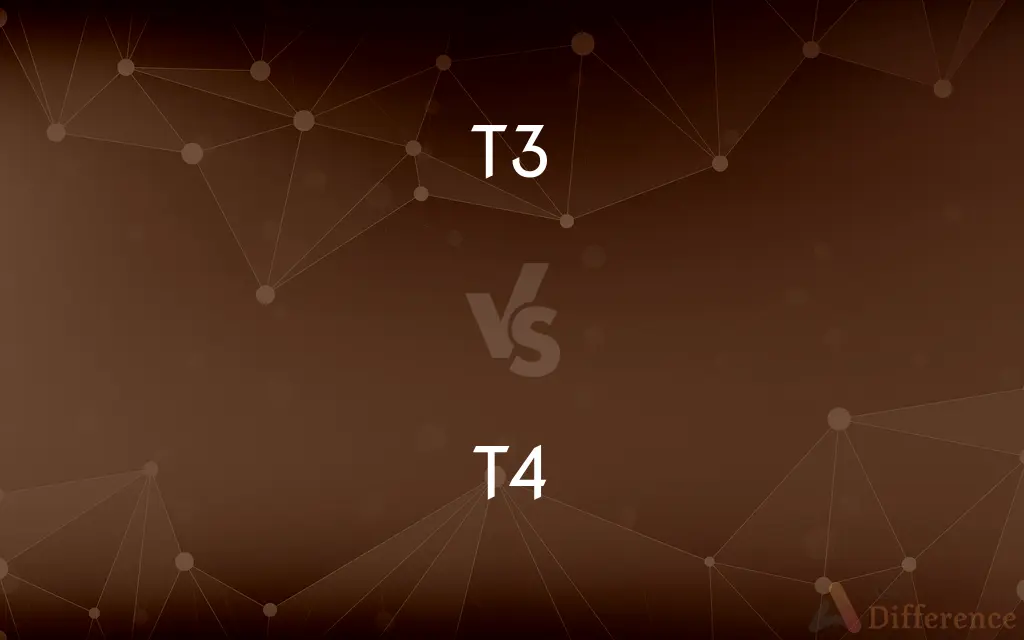T3 vs. T4 — What's the Difference?
By Tayyaba Rehman — Published on January 10, 2024
T3 (triiodothyronine) is a thyroid hormone that affects almost every physiological process, while T4 (thyroxine) is another thyroid hormone that is a precursor to T3 and generally less active.

Difference Between T3 and T4
Table of Contents
ADVERTISEMENT
Key Differences
T3, or triiodothyronine, is a thyroid hormone that is biologically more active than T4, affecting various physiological processes such as growth, metabolism, and heart rate. T4, or thyroxine, is also a thyroid hormone but is less active and serves primarily as a precursor to T3, which means T4 is converted into T3 in the body to exert its effects.
T3 is more potent than T4, with about three to four times the hormone strength. In clinical settings, T3 is used in smaller doses compared to T4 due to its higher potency. T4, being less potent, is often present in higher concentrations in the blood and is used in higher doses when prescribed as a medication.
The body converts T4 into T3 through the removal of an iodine atom, a process that occurs mostly in the liver and kidneys. This conversion is crucial for the regulation of metabolism, as T3 is the hormone that actively interacts with cells. In contrast, T4 circulates in the blood as a reserve to be converted into T3 as needed.
T3 has a faster onset of action and a shorter biological half-life than T4, meaning it is metabolized and excreted from the body more quickly. This rapid action of T3 is why some clinicians may choose it for treatment over T4, which has a longer half-life and a slower onset of action but is typically the preferred choice for thyroid hormone replacement therapy.
While T4 is the predominant hormone produced by the thyroid gland, T3 is considered the more metabolically active hormone, exerting significant physiological effects even in small quantities. Both T3 and T4 levels are commonly measured to assess thyroid function and diagnose thyroid disorders.
ADVERTISEMENT
Comparison Chart
Biological Activity
High biological activity
Less biologically active, a precursor to T3
Hormone Strength
3-4 times more potent than T4
Less potent than T3
Blood Concentration
Lower concentration in the blood
Higher concentration in the blood
Biological Half-Life
Shorter half-life
Longer half-life
Role in Metabolism
Active form that directly affects metabolism
Converted into T3 to become active
Compare with Definitions
T3
Directly influences cellular metabolic processes.
T3 directly interacts with nuclear receptors to modulate DNA transcription.
T4
A precursor hormone converted to T3.
The body converts T4 into the more active T3.
T3
Often measured to diagnose hyperthyroidism.
High T3 levels may indicate an overactive thyroid.
T4
Has a longer half-life than T3.
T4's longer half-life allows for once-daily dosing.
T3
Less abundant in the bloodstream than T4.
Despite lower serum levels, T3 has significant physiological effects.
T4
Less metabolically active until converted.
T4 must be converted into T3 to effectively regulate metabolism.
T3
A potent form of thyroid hormone.
T3 levels are crucial for metabolism regulation.
T4
Typically found in higher quantities in the blood.
T4 levels are commonly tested to evaluate thyroid function.
T3
Rapid-acting compared to T4.
T3 supplements can quickly alter metabolic rates.
T4
The primary hormone produced by the thyroid gland.
T4 is released into the bloodstream in response to TSH stimulation.
Common Curiosities
Which is more active, T3 or T4?
T3 is more biologically active than T4.
Why are both T3 and T4 levels checked in thyroid tests?
To assess thyroid function comprehensively and diagnose thyroid disorders.
Are T3 and T4 levels affected by iodine intake?
Yes, iodine is essential for the production of both T3 and T4.
What do T3 and T4 stand for?
T3 stands for triiodothyronine and T4 for thyroxine, both thyroid hormones.
Can T4 be converted to T3 in the body?
Yes, T4 is converted to T3 in organs like the liver and kidneys.
Do T3 and T4 have the same function in the body?
They both influence metabolism, but T3 is the active form that directly affects cells.
Can T3 levels fluctuate rapidly?
Yes, T3 has a shorter half-life and can fluctuate more throughout the day.
Can T3 and T4 be taken together as treatment?
Yes, combined therapy is used in certain clinical situations.
Which hormone is typically higher in blood, T3 or T4?
T4 is typically higher in concentration in the blood.
Does T3 or T4 have a faster onset of action?
T3 has a faster onset of action than T4.
Are there synthetic versions of T3 and T4?
Yes, both synthetic T3 (liothyronine) and T4 (levothyroxine) are available.
Is T4 less potent than T3?
Yes, T4 is less potent and acts as a reservoir for T3.
Can T3 be used to treat depression?
Yes, T3 is sometimes used as an adjunct treatment for depression.
Is T4 or T3 given as a medication for hypothyroidism?
T4 is commonly prescribed, but sometimes T3 is used.
Is it possible to have normal T4 but abnormal T3 levels?
Yes, it is possible, especially in cases of impaired T4 to T3 conversion.
Share Your Discovery

Previous Comparison
Double Entry System vs. Double Account System
Next Comparison
Photic Zone vs. Aphotic ZoneAuthor Spotlight
Written by
Tayyaba RehmanTayyaba Rehman is a distinguished writer, currently serving as a primary contributor to askdifference.com. As a researcher in semantics and etymology, Tayyaba's passion for the complexity of languages and their distinctions has found a perfect home on the platform. Tayyaba delves into the intricacies of language, distinguishing between commonly confused words and phrases, thereby providing clarity for readers worldwide.
















































